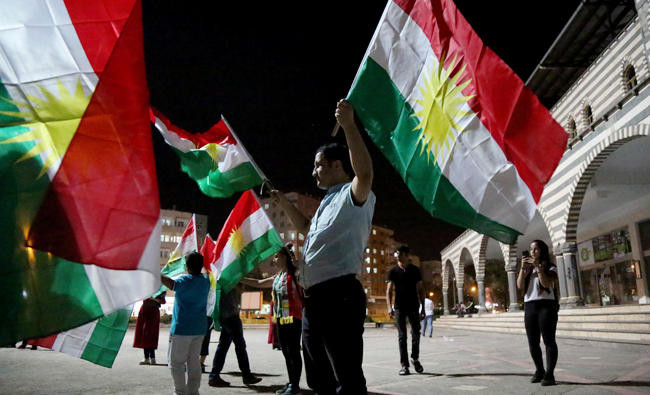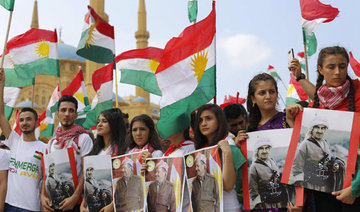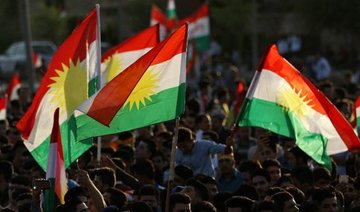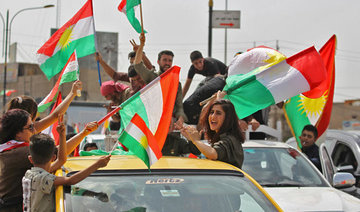ANKARA: As the Kurdistan Regional Government (KRG) has ignored Ankara’s warnings against holding an independence referendum for Iraqi Kurdistan, Turkey is getting ready to implement sanctions.
Its options include closing the Habur border crossing, freezing exports and oil and gas purchases from the KRG, and intensifying diplomatic efforts to convince other regional countries to implement similar measures.
In line with President Recep Tayyip Erdogan’s upcoming visit to Iran on Oct. 4, Ankara also intends to take joint steps with Tehran against the KRG.
Turkey’s top media watchdog RTUK removed the northern Iraq-based Rudaw from satellite broadcasting on the day of the independence vote.
Turkey’s Foreign Minister Mevlut Cavusoglu on Monday said his country’s military will cut its support for training Kurdish Peshmerga forces.
Prime Minister Binali Yildirim said: “We won’t enter an adventure unexpectedly in any way, but if there’s an attitude that will harm the interests of our country, we’ll respond without delay.”
Erdogan took a tougher stance, saying Turkey will not allow the formation of terrorist states along its borders.
“We could come suddenly one night,” he said on Monday. “Irrespective of the result, we see this (referendum) as null and void, and say it’s illegitimate.”
Bilgay Duman, an expert on Iraqi affairs at Ankara-based think tank ORSAM, said the decision to go ahead with the referendum was irresponsible.
He added that KRG President Masoud Barzani’s motives in doing so were to raise the stakes and enhance his bargaining position with Baghdad.
“There’s a serious political crisis going on in the KRG since his opponents rejected extending his term in office in 2015, while financial difficulties were also undermining his authority,” Duman told Arab News.
“Turkey won’t sit and watch developments unfold after the referendum.***It will implement diplomatic, political, economic and military sanctions at the same time.” Duman said Turkey will probably strengthen ties with Baghdad, as shown by the recent visit of the Iraqi Army’s Chief of Staff Othman Al-Ghanmi to Ankara on Saturday.
In reaction to the referendum, both countries’ armies started joint military maneuvers on the Turkish side of the border on Monday evening.
“A new operation by Turkey in northern Iraq’s Sinjar mountains against the Kurdistan Workers’ Party (PKK) may be expected in the near term, considering that the Turkish Parliament on Saturday allowed military operations in northern Iraq,” Duman said.
Closing Habur, the only gateway for the KRG to trade with the world, would suffocate its economy, he added.
“In 2015, during a military operation against PKK hideouts, Turkey closed its border gate for just 22 days, and even the price of a bottle of water skyrocketed at that time,” he said.
But Galip Dalay, research director at Al-Sharq Forum in Istanbul, said he does not expect military ramifications.
“The outcome (of the referendum) will be economic and diplomatic,” Dalay told Arab News. “In the short term, Turkish-KRG relations will suffer. Given the nature of discourse in Turkey, it’s likely that Ankara will take some steps. But I don’t think it will be long-running and drastic.”
Relations between Ankara and Baghdad will improve in the short term due to their opposition to the Kurdish bid for statehood, he said.
“But in the mid-to-long-term, I’m not that optimistic about the relations. Both countries’ strategic orientations and alliance structure remain opposed to each other,” he added.
Turkey readies sanctions against Iraqi Kurds over referendum
Turkey readies sanctions against Iraqi Kurds over referendum

Iran temporarily closes airspace to most flights

WASHINGTON: Iran temporarily closed its airspace to all flights except international ones to and from Iran with official permission at 5:15 p.m. ET on Wednesday, according to a notice posted on the Federal Aviation Administration’s website.
The prohibition is set to last for more than two hours until 7:30 p.m. ET, or 0030 GMT, but could be extended, the notice said. The United States was withdrawing some personnel from bases in the Middle East, a US official said on Wednesday, after a senior Iranian official said Tehran had warned neighbors it would hit American bases if Washington strikes.
Missile and drone barrages in a growing number of conflict zones represent a high risk to airline traffic. India’s largest airline, IndiGo said some of its international flights would be impacted by Iran’s sudden airspace closure. A flight by Russia’s Aeroflot bound for Tehran returned to Moscow after the closure, according to tracking data from Flightradar24.
Earlier on Wednesday, Germany issued a new directive cautioning the country’s airlines from entering Iranian airspace, shortly after Lufthansa rejigged its flight operations across the Middle East amid escalating tensions in the region.
The United States already prohibits all US commercial flights from overflying Iran and there are no direct flights between the countries. Airline operators like flydubai and Turkish Airlines have canceled multiple flights to Iran in the past week. “Several airlines have already reduced or suspended services, and most carriers are avoiding Iranian airspace,” said Safe Airspace, a website run by OPSGROUP, a membership-based organization that shares flight risk information.
“The situation may signal further security or military activity, including the risk of missile launches or heightened air defense, increasing the risk of misidentification of civil traffic.” Lufthansa said on Wednesday that it would bypass Iranian and Iraqi airspace until further notice while it would only operate day flights to Tel Aviv and Amman from Wednesday until Monday next week so that crew would not have to stay overnight.
Some flights could also be canceled as a result of these actions, it added in a statement. Italian carrier ITA Airways, in which Lufthansa Group is now a major shareholder, said that it would similarly suspend night flights to Tel Aviv until Tuesday next week.












